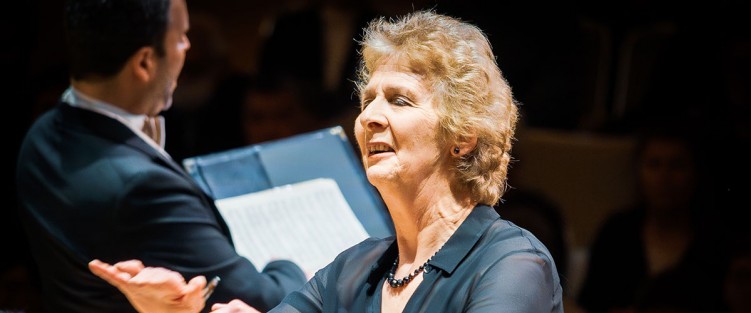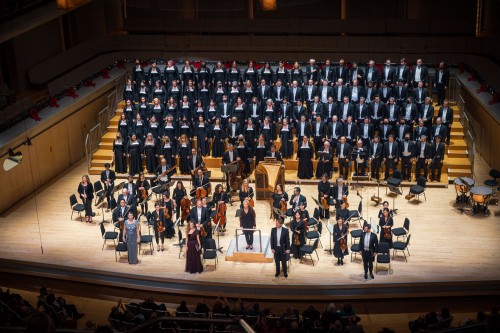 “It’s one show stopper after another, isn’t it? There’s not a bad number in it,” is what conductor Jane Glover, DBE, says when I ask how she explains the enduring appeal of Handel’s Messiah. We met and talked in December in the lobby of her hotel in downtown Toronto, one day after she’d conducted the first of five Messiah concerts with the Toronto Symphony Orchestra and the Toronto Mendelssohn Choir in a near-full Roy Thomson Hall. Her new book, Mozart in Italy, had come out earlier in 2023, and Toronto was a cap on a busy, Atlantic crisscrossing year.
“It’s one show stopper after another, isn’t it? There’s not a bad number in it,” is what conductor Jane Glover, DBE, says when I ask how she explains the enduring appeal of Handel’s Messiah. We met and talked in December in the lobby of her hotel in downtown Toronto, one day after she’d conducted the first of five Messiah concerts with the Toronto Symphony Orchestra and the Toronto Mendelssohn Choir in a near-full Roy Thomson Hall. Her new book, Mozart in Italy, had come out earlier in 2023, and Toronto was a cap on a busy, Atlantic crisscrossing year.
The TMChoir was out in full force in Messiah, right there on stage with a greatly reduced orchestra. “We started with more string players but I took it down to 8-6-4-4-2 because that is plenty, even with a big choir,” Glover says. This audience member can attest that there was never any imbalance: both the choir and the instrumentalists covered a remarkable range of dynamics in happy accord. Knowing Glover’s history with Historically Informed Performance, the TSO musicians adjusted accordingly. “We talked for the first five minutes about vibrato and if and when to use it as an expressive device, and they all knew what I meant. I love them for that. Some of the TSO musicians even held their bow differently… It was marvellous. It alters what you do with the stroke and the sound you produce.”
She also spent some time with the choir on its own. “They carry so much. I just wanted to persuade them to help me tell stories. Telling two stories – Nativity and Crucifixion – and then reflecting on it. I hope that came over.”
Dame Jane completed her PhD on Cavalli, Monteverdi and the seventeenth-century Venetian opera, and has been part of the early historically-informed movement in England, producing her own performing editions of all three Monteverdi operas. Soon after graduation, however, she expanded into other eras and styles. Does it matter to her if Handel or Bach is performed on period or modern instruments? “The short answer is no. The longer answer is: most musicians today know how to achieve the style on modern instruments as well.” Music of the Baroque ensemble in Chicago, where she has been Music Director for 20 years, is a case in point, she says. “They are the best players in Chicago, many of them in the Chicago Symphony Orchestra, many in the Lyric Opera orchestra, and they come to us to play our repertory, which is basically the eighteenth century, because they love it. It’s a tremendous commitment for them; we’re often the third session in their day. Half of the orchestra has been playing Bruckner with Muti and the other half Wagner with Andrew Davis, and they come to us and play Bach and Handel. And it takes us maybe five minutes to find our sound.”
I noticed last night, I tell her, that she was conducting Messiah without the score, completely from memory. I’ve read somewhere that she conducted it more than one hundred times, I say. “It’s now probably about 112? I treasure a tote bag given to me in 2018 by the Cleveland Orchestra: ‘Jane Glover conducts her 100th performance of Messiah’.” It’s the piece she first heard, as she explains in her 2018 book Handel in London: The Making of a Genius, at the age of 9, in Lincoln Cathedral. “I was blown away by it,” she says. “It wasn’t the big stuff, the Hallelujah chorus, the Amen or The Trumpet; the thing that really got me was ‘I know that my Redeemer liveth’, the soprano air later in the piece.”
Huge credit goes to the librettist Charles Jennens too, she adds, who assembled the texts in the beautiful language of the King James Bible. “What a brilliant job Jennens did. He also wrote the librettos for Handel’s two greatest oratorios, Saul and Belshazzar. He knew his way around the Old Testament. It was a curious relationship between them but boy was it productive.”
Glover has done Messiahs, as she puts it, “of all sorts and all sizes,” including once with a choir of 400-something in Sydney. The one that delighted and surprised her the most though was Mozart’s version. “His was about 50 years after Handel wrote it. Which goes to show that by then, when Mozart added stuff, Handel’s version was out of fashion. And Mozart orchestrated it with enormous respect and quite a lot of fun. It’s one genius seen through the eyes of another.” What changes did he introduce? “He modernizes the orchestra. He added horns and flutes and where things were not orchestrated-through, he did that. ‘The trumpet shall sound’ is actually on a horn, which is wacky. And there are clarinets. First time I ever did it, I jumped in at the last minute for an ailing Charles Mackerras. I got a call on the morning of the concert and I spent the whole afternoon in rehearsal chuckling with joy at what Mozart had done. It was just so witty.”
While she is best known for the eighteenth century repertoire, her interests don’t end there. I tell her I had been listening to her Desert Island Discs on the BBC Radio Four archives the night before, where besides the expected Mozart and Handel, she chose Mahler’s Der Abschied, and one of Britten’s Sea Interludes from Peter Grimes. “There is a bit of a lacuna – I don’t do much nineteenth-century music, it has to be said. Nobody will ask me to do Wagner again… and in fact I’ve come to Wagner quite late but I absolutely love it now, can’t get enough of it. And probably no one will ask me to do a Verdi opera.” When she was the director of opera at the Royal Academy of Music in London, she did conduct a variety of operas, an Onegin, some Puccini. “But it’s not really what I’m known for. The 18th century is where I live.”
She has conducted Mahler as well, but mostly in the reduced, Schoenberg orchestration, though a big-orchestra Ruckert Lieder performance with Sarah Connolly is a notable exception. “I’ve done a bit of Strauss too. Rosenkavalier is one of the operas that I hope to do before I pack away my baton. And I do think Rosenkavalier ought to be conducted by a woman!” Another composer who’s been very important to her is Benjamin Britten. She met him and Peter Pears as a young teen (and ardent Britten fan) when the pair came to her hometown to perform a recital. Her father was the school headmaster and Britten came by their house. “Beautiful and elegant” is how she remembers them, and generous with young musicians.
In her Desert Island Discs, she also chooses Virginia Woolf’s letters as the book she would take to the desert island. Her love of Woolf? “What a writer! Funnily enough, I have a book called Shakespeare in Bloomsbury by Marjorie Garber. The Bloomsbury artists worshipped him. The book is a fabulous companion on the road.” Does she prefer Woolf’s fiction or the letters? “All of it, really. In letters and diaries you really get to know her, and the novels and the essays are brilliant creations. I keep coming back to her. I remember having a five-hour stopover at an airport once and I just quietly sat in a corner and read Mrs Dalloway again. It’s one of my favourite novels.”
She has yet to see The Hours, the opera version of the 1998 Michael Cunningham novelistic tribute to Mrs Dalloway, which premiered last year at the Metropolitan Opera, though she did see the movie version with Nicole Kidman as Virginia Woolf.
Talk of movies inevitably leads us to two recent Hollywood films about conductors. “I thought Bradley Cooper’s Maestro was brilliant,” she says. And Tár? “I put off seeing it for a long long time because everybody was asking me about it all the time. But then I watched it on a flight.” Marin Alsop complained about it, I remind her: that it depicts women conductors – and gay women conductors in particular – in a terribly negative light. “I understand where she’s coming from,” Glover says. “I sympathise with her judgment.” But, I object, Tár had to be an art monster or there wouldn’t be a story. “The thing is,” says Glover, “it is not a story about my profession, it was a story of self-destruction. And in this sense, it was a brilliant movie. And I worship Cate Blanchett anyway, and it was a stonking performance by her. But I have to say, there was not much of my profession that I recognized. And I don’t know any conductors any more who treat orchestral musicians like that. Nor do I know any conductors who travel in private planes by the way. And every time my plane is cancelled or I have to wait for a missing suitcase, I think, ‘Well this never happened to Tár’.”
And Tár is probably about the Karajan generation of conductors, except moved to our time, I suggest. “Yes. And the Bernstein movie is not a biopic exactly. It’s a portrait of a marriage. Both principal actors are brilliant in it. Cooper was extraordinary… and what he did with Mahler 2 in the Ely Cathedral. He was of course coached by Yannick [Nézet-Séguin], one of the best-known Canadian musicians in the world right now. It was a very warm movie, and it had a great deal of heart. And Carey Mulligan can show you what she’s thinking without doing anything.” So the conducting looked credible, it passed the test? “It did, more than Cate Blanchett to be honest. Though she made a good fist of it.”
She must get tired of questions about women in the conducting profession, I suggest, but she was indeed one of the very first ones who built an international career. Orchestras now regularly programming women did nothing of the sort in her youth. “Yes, it’s changed radically in the last five years even. Ten certainly. It’s lovely. The playing field is still not level but it’s much less steep than it was. I love it that everywhere I go there seem to be women who are assisting or getting the job. There are two on a program that I’m assisting this week (Tapestry Opera’s program for women in conducting) and they’re excellent. We have a program at the RAM to which I’m still attached as a visiting professor, which is called the Glover-Edwards Programme after me and Sian Edwards. We are the oldest basically in the UK and Sian runs the conducting department at the Academy now and this is a program just for women. They come from all over and they meet three or four times a year for intensive weekends with us. It’s a joy.”
Dame Jane Glover will conduct in Chicago, New York, Cincinnati and Houston this year. Full details on her website.
Lydia Perović is a culture writer in Toronto. You can read a longer, Q&A version of the interview with Dame Janet Glover in her newsletter longplay.substack.com.




